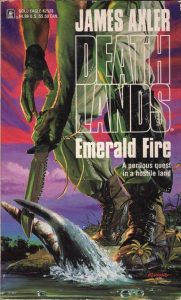 I haven’t read anything but comics in about a week, because I’m behind on this book review. The irony is, of course: in what world am I worried about the quality of a Deathlands review that nobody cares about?
I haven’t read anything but comics in about a week, because I’m behind on this book review. The irony is, of course: in what world am I worried about the quality of a Deathlands review that nobody cares about?
Emerald Fire was a mixed bag. I liked the setting (somewhere in Central America, for a change of pace) and the idea of helping local tribes against slavers trying to keep a silver mine running. I probably should mind the “American saviors of helpless natives” trope, up to and including the part where the albino kid was worshipped as their god. But that was overshadowed by the part where our heroes were nobly disgusted by all the ritual human sacrifice.
It’s like, in-world you’re descendants of the people who blew up the world, and your home stomping grounds treat life as cheaply as the rotgut that passes for liquor; and from the reader’s perspective, you’re a subgenre mashup of two barely respected literary forms. In each of these cases, you’re not good enough to cast aspersions at other cultures.
Of course, the problem here is, now I’m forced into the role of apologist for cultural relativism and human sacrifice, and that’s not very exciting for me. But man were they being holier-than-thou about it.
Oh, hey. One other random thing, regarding the cover. I wonder if they had this in mind for an earlier book, but it wasn’t ready in time or something like that? Because two books ago, there was definitely a fight with a giant mutant crab. There equally definitely was nothing crablike in this book. So!
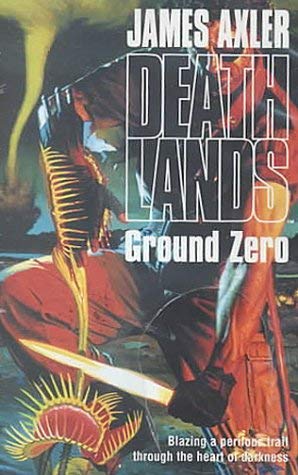 Sometimes the title of a Deathlands book will make me scratch my head in puzzlement, since it seems like they just took a couple of random words, one of them semi-complex, and strung them together, irrespective of the plot of the book. Other times, such as
Sometimes the title of a Deathlands book will make me scratch my head in puzzlement, since it seems like they just took a couple of random words, one of them semi-complex, and strung them together, irrespective of the plot of the book. Other times, such as 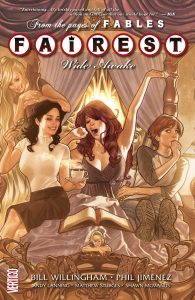 There’s another Fables series, apparently, which makes this I think the third spin-off? Fairest looks like it will be an anthology series focused on famous female fables, and I’m perfectly happy with that idea. (My first thought was, why can’t these stories just go in Fables instead, but I get that Willingham probably has some kind of master plan for where the plot is going. It has certainly been a plot-dense series to date! So I guess a spin-off is the only place to tell side stories.) At the same time… man, this is a lot of books.
There’s another Fables series, apparently, which makes this I think the third spin-off? Fairest looks like it will be an anthology series focused on famous female fables, and I’m perfectly happy with that idea. (My first thought was, why can’t these stories just go in Fables instead, but I get that Willingham probably has some kind of master plan for where the plot is going. It has certainly been a plot-dense series to date! So I guess a spin-off is the only place to tell side stories.) At the same time… man, this is a lot of books.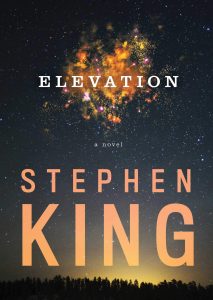
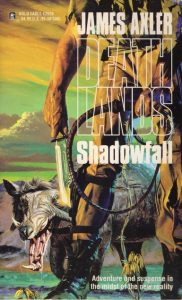 By now you know the Deathlands drill, or have been ignoring reviews of the series and will ignore this one too. The main things that stand out about
By now you know the Deathlands drill, or have been ignoring reviews of the series and will ignore this one too. The main things that stand out about 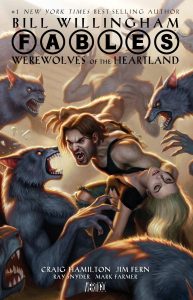
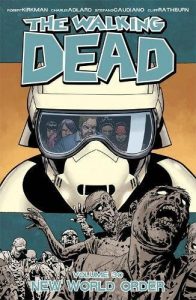 There are now thirty Walking Dead books. That’s nearly 200 issues of the comic, for values of nearly that are two to three years out. But still!
There are now thirty Walking Dead books. That’s nearly 200 issues of the comic, for values of nearly that are two to three years out. But still!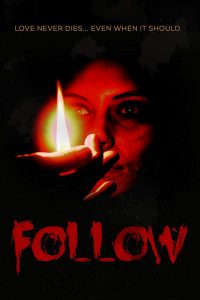 I ate too much yesterday. As a result, I watched a movie last night despite exhaustion, because I was too full to go to sleep. (I mean, to do so comfortably.) Unrelatedly, I finally got Shudder working again on my Roku. The intersection of these facts is that I watched a semi-random movie called
I ate too much yesterday. As a result, I watched a movie last night despite exhaustion, because I was too full to go to sleep. (I mean, to do so comfortably.) Unrelatedly, I finally got Shudder working again on my Roku. The intersection of these facts is that I watched a semi-random movie called 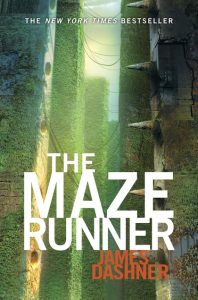 I finished
I finished 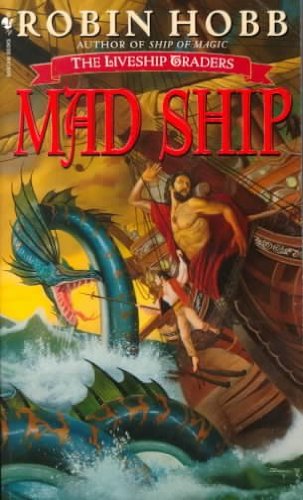 I’ve read another Robin Hobb book, which is nice because the book was nice!
I’ve read another Robin Hobb book, which is nice because the book was nice!